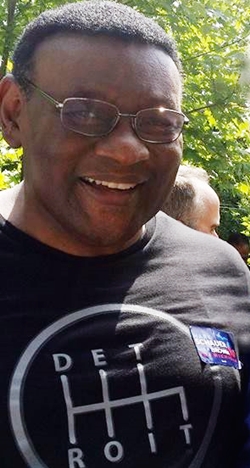A chilling thought flashed into Isaiah McKinnon's mind the first time he watched the Minneapolis video seen around the world.
"George Floyd could have been me," the former Detroit police chief writes at the start of a Free Press guest column.
McKinnon joined the city's force in the summer of 1965, four years after graduating from Cass Tech High School and entering the Air Force. He served as chief from 1993-98 under Dennis Archer and was deputy mayor from 2014-16 under Mike Duggan.

"Ike" McKinnon: "what were they willing to do to Black civilians?" (Photo: Facebook/2014)
In his vivid commentary, the 76-year-old retiree -- still a Detroiter -- recalls blatant racism when he entered law enforcement five and a half decades ago:
As a rookie officer, I encountered overt and casual bigotry and routine denigration and brutality. Many white officers refused to ride alongside Black officers. Some made cardboard dividers in patrol cars — designating the “white” section from the “colored.” Others used Lysol to “disinfect” seats where Black officers sat. Some of my white colleagues refused to speak with me during shifts, dared not eat near or with me, and frequently used the “N-word” to describe me and the African American citizens they were sworn to protect.
Two years later, I felt the sting of betrayal as an officer during the 1967 rebellion. One night, after a grueling shift, two white DPD officers pulled me over. I was still in uniform, badge affixed to my chest, and a #2 pin on my collar, indicating that I worked in the 2nd Precinct. I identified myself as a fellow officer, thinking they would see me as an equal. Instead, one pointed his gun at me and said, “tonight you’re going to die, N....” before discharging his weapon. I dove back into my vehicle and miraculously managed to escape. I realized then that not even our shared uniform could save me from their racism. And I wondered if they were willing to shoot and kill a Black police officer, what were they willing to do to Black civilians?
As a supervisor a few years later, I stopped a group of officers from beating three Black teens. I was finally in a position to hold them accountable for their excessive use of force. But my precinct commander yelled at me for attempting to "ruin the lives of those good officers."
I witnessed this kind of complicity repeatedly. When other officers reported abuse, as they should, they were ostracized, transferred to lesser assignments and treated so poorly that many quit.
McKinnon, known widely as "Ike," wraps up with a call for "a change at all levels" and suggests five starting points.
Now is the time to get to the heart of the matter: There must be a major effort to fundamentally restructure police departments so that they actually do what they promise: serve and protect all people.











